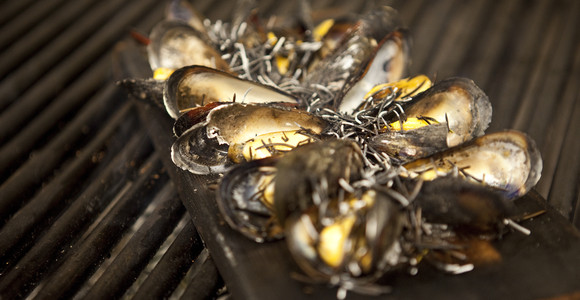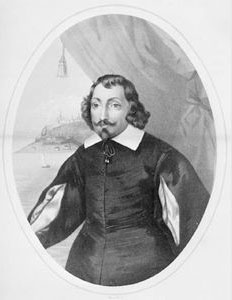Parks Canada Heritage Gourmet Recipes
L’Éclade
This recipe for l’éclade is over 400 years old!

Origin: Port-Royal National Historic Site
Region: Atlantic (Nova Scotia)
Period: Pre-18th Century
Course: Main Course
 Samuel de Champlain
Samuel de Champlain© Library and Archives Canada, C-006643; Artist: Louis-César-Joseph Ducornet, 1806-1856
This recipe for l’éclade is over 400 years old. It was first cooked by fishermen along the shore near Brouage, France, the birthplace of the explorer Samuel de Champlain, pictured above. In 1598 Champlain made his first crossing of the Atlantic Ocean and he settled in Port Royal in 1605. He used Port-Royal as his base for the next three years while he sailed and charted the coast.
Perhaps one of the first true “foodies,” Champlain was the founding member of the Order of Good Cheer, or L’Ordre de Bon Temps, a dining society whose members took turns providing game for the table and maintaining an atmosphere of merriment. As mussels are readily available along the Bay of Fundy shoreline, Champlain is likely to have shared a good feast of these shellfish prepared in the customary fashion of his region of birth.
L’Éclade
Ingredients:
- 6 lb | 3 kg mussels
- 1 large bag of dried pine needles
- Pine board about 18 inches square
- Bread and butter
Directions:
- Collect a bag of pine needles and let them become very dry.
- One hour before cooking, soak the pine board in water. Beginning at the centre of the board, arrange four mussels in the form of a cross. Insert mussels one by one between each mussel in the centre. Enlarge the circle until the board is covered with mussels. Cover with pine needles, about 6 to 8 inches thick.
- Light each corner and re-cover with more needles (4-5 inches thick). Use a fan to help flame. The shells will become nearly black. Fan the ashes off the mussels (a calendar works well).
- Open and serve on a serving plate. Serve with thick slices of buttered bread.
Credits:
Recipe tested by Chef Sean Edwards, Algonquin College School of Hospitality and Tourism
The original recipe is traditional, but this version appeared on the CBC radio show Ideas.
Related links
- Date modified :